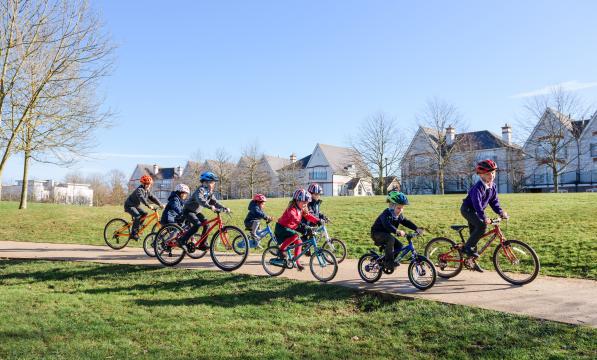Renewed call to encourage more young people onto their bikes after a shocking report on childhood obesity

- New data shows stark rise in childhood obesity between ages 7 – 11
- Cycling UK believes a ‘Netherlands model’ could be the answer
- Sugar Tax funding for primary schools to encourage more active journeys to school
New data from the Millennium Cohort Study, and reported by the BBC, has highlighted a ‘stark’ increase in the proportion of children who are overweight or obese between the ages of seven and 11.
The study of nearly 12,000 children in the UK by researchers from the Centre for Longitudinal Studies at the UCL Institute of Education, found 25 per cent were overweight or obese at the age of seven, but that had risen to 35 per cent at the age of 11.
Cycling UK believes one of the key ways to reduce obesity in the young is by getting more children on their bikes.
Duncan Dollimore, Cycling UK, Head of Campaigns, said: “Almost 50 per cent of children make their school journey by bike in the Netherlands - in the UK it’s just two per cent. It’s therefore no surprise that we see such a disparity in childhood obesity levels.
“Getting more young people cycling to school should be a public health priority. Primary schools can now use proceeds from the ‘Sugar Tax’ to encourage active journeys to school. They need to do this and government must consider extending this to secondary schools.”
The Department for Education recently announced it was doubling the funding for primary schools to improve the quality of their PE and sports provision to £320m a year, paid for through the so-called Sugar Tax levy on the fizzy drinks industry.
This money will enable primary schools to do more to increase the numbers of children cycling and walking to school.
Cycling to school or college not only helps pupils keep fit and healthy, it also has the capacity to boost their confidence, independence and sense of self-worth.
It has the additional benefit of tackling local congestion, pollution and road dangers created by the school run.
Danish studies have also shown that cycling to school also lowers young people’s risk of cardiovascular disease.
Although many children want to cycle to school, on average only around 1 to 3 per cent do so each year in the UK.
In the Netherlands, where most children cycle to and from school, it’s reported that obesity levels in children are significantly lower.
According to the The Centre for Social Justice, Amsterdam is the only city in Europe to reduce obesity rates in the last five years.
For more information on cycle friendly schools, read our background briefing
Notes to editors
- Cycling UK, the national cycling charity, inspires and helps people to cycle and keep cycling, whatever kind of cycling they do or would like to do. Over a century’s experience tells us cycling is more than useful transport; it makes you feek good, gives you a sense of freedom and creates a better environment for everyone. www.cyclinguk.org
- Through the Sugar Tax, the Department for Education has made funding available for primary schools via the PE and Sports Premium to embed physical activity into the school day through active travel to and from school. This funding can also be used to train teachers as Bikeability instructors: www.gov.uk/guidance/pe-and-sport-premium-for-primary-schools
Press contact information
For more information contact the national Cycling UK Press Office on 01483 238315, 07786 320713, or email [email protected]




